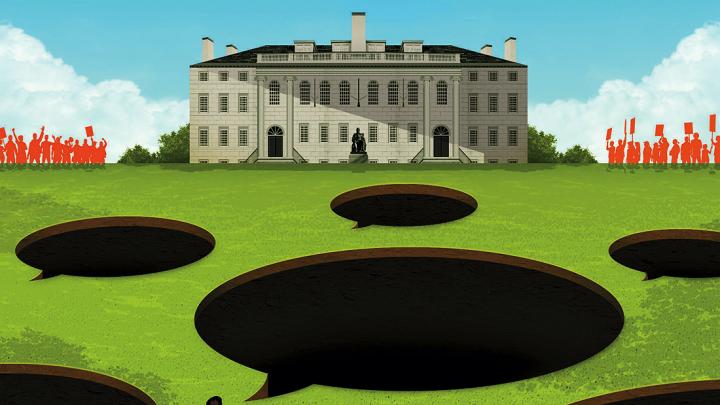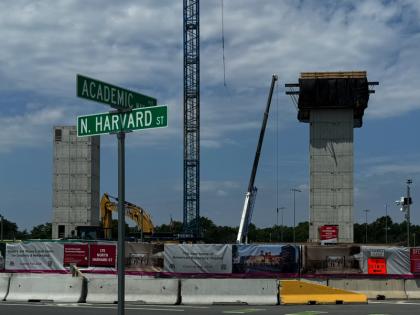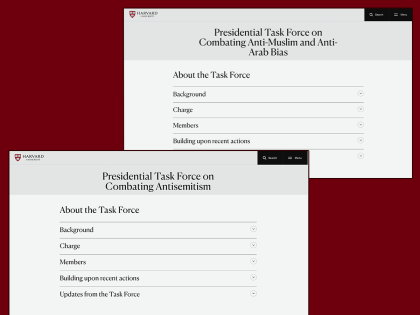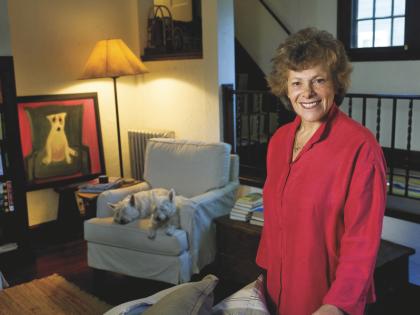This academic year, Harvard’s campus has been a political powder keg. Many commentators are rightly concerned about free speech at this University and others, but the current national discussion has overlooked the harmful effects of its own presence. A disproportionate focus on our campus can exacerbate the effects of echo chambers. When Harvard is used to score points in national political fights, students are disincentivized from trying out new positions and taking on intellectual risks. The result is self-censorship and political sorting across the ideological spectrum where students surround themselves with like-minded friends.
This dynamic became apparent in a recent disagreement I had with a fellow student. We had researched how campus ideology has changed over time, measured by textual analysis of course descriptions and student newspaper articles. The results showed some evidence that validated a liberal critique (such as an outsized curricular focus on America and Europe), and other facts that validated conservative talking points (such as course syllabi exhibiting increasingly anti-capitalist attitudes).
My friend and I were both initially wary about publishing an article on our findings, even though we wouldn’t be arguing the changes were either good or bad—we would simply document the shifts. But I thought that however neutrally I presented the results, they would be seized on by members of both sides in a way that would politicize me and my work, potentially affecting my career or friendships down the line. We weren’t wary of criticism but, rather, reputational consequences.
However irrational such concerns might seem, I think many Harvard students are similarly cautious. I’ve written in The Crimson about how their growing aversion to risk seeps into every aspect of college, from careerism to course selection. Free speech is no different: risk-averse students, intimidated by the permanence of the internet and the spotlight on Cambridge, likely disengage from political controversies to avoid potential professional or personal fallout. Indeed, according to a survey done by the Foundation for Individual Rights and Expression, a majority of Harvard students worry about damaging their reputation because someone may misunderstand something they said or did.
I’ve spoken to countless students who said they would never publish something relating to Israel-Palestine or take a public stance because they don’t want it to hurt them 20 years hence. Though current Secretary of State Anthony Blinken ’84 wrote about the issue for The Crimson when he was an undergraduate (“Where It Hurts,” December 6, 1982), it’s hard to imagine a centrist student today analyzing foreign policy publicly. But the Anthony Blinkens of tomorrow will likely be less informed for having withdrawn from the debate.
In the same way, my decision not to publish the piece about our research findings caused me to miss out on initiating a public debate from which I might have learned. And my friend mentioned that he recently chose not to publicly oppose a position taken by a publication with which he is involved: he “just didn’t care” enough to dissent, citing the potential reputational damage of being in the minority on the issue.
This language is concerning: so many students simply deem the cost of entering the political fray excessive. Disengagement was common during the student encampment in Harvard Yard (see page 17). I continually heard from professors and students that most people on campus seemed apathetic toward the protests or were simply burnt out from Israel-Palestine discussions.
In other cases, students’ withdrawal can be explained by the consequences of involvement (for either side). I recently heard about a first-year student who joined an ethnic-affinity organization that signed the controversial October 7 student statement (which held Israel “solely responsible” for the violence unleashed by Hamas), unbeknownst to her. She was doxxed afterward and subject to online harassment.
Given this potential for harassment, no wonder students shy away from the issue, but we lose out on learning and growth, including the very skills of forming and defending opinions necessary to a full college education. Clyve Lawrence ’25, a progressive organizer on campus, echoed this observation in the context of the attention Harvard has received post-October 7: “The magnifying glass that was put on Harvard…poisons our discourse because we don’t have the room to figure out our position for learning,” he said. “And it does dissuade people from feeling like they should have an opinion when you have such a large attack on our own campus.”
Indeed, I tried to speak with students across the political spectrum for this column, but most of those willing to go on record were on the committed far left or the far right. Centrist students repeatedly declined to talk. I take their refusal as a reaction to the vague specter of a national audience that hangs over campus, checking students’ instincts not only before they write but before they choose to think about an issue at all. The political ecosystem on campus, rather than representing the full spectrum of beliefs, becomes hollowed out in the middle.
These two polarized sides of the spectrum rarely mix, a problem I view as also partially produced by the national political attention directed at our campus. For the same reasons that Harvard students may not want to speak publicly lest their speech be appropriated for external political purposes, so too do they fear the reputational and professional risks of engaging with opposing political groups—or at least I did. Recently, one friend, who was critical of the encampment, refused an invitation to talk with protesters because she was afraid of being photographed at the location. The 2023 Crimson senior survey asked, “Among your closest friends, how many share your political views?” About 60 percent of very progressive seniors said most of their friends share their views.
Ari Kohn ’26, a fellow with Harvard’s Intellectual Vitality Program (an initiative at the College meant to encourage civil discourse), said in an interview that college should be a place to “learn from people who are different from us and embrace the fallibility that’s at the center of education.” For the same reasons, Fiona Zimmerman ’24, a senior, told me that Harvard “is failing people on the left.”
But it’s not only liberal students who are cocooned by like-minded peers. Although Harvard conservatives represented less than 5 percent of last year’s graduating class (according to the Crimson’s data), these seniors also said most of their friends shared their politics. Harvard has become an echo chamber no matter your politics, since students have sorted socially along political lines.
Part of this political segregation is a pragmatic hesitancy. Every public gathering is liable to be reported on nationally, potentially constituting a professional risk. Even after realizing how politically cloistered I had been my first two years here, I was wary to be seen in any avowedly conservative space.
Another part of the political segregation can be explained by Harvard’s idiosyncratic club culture, since social relationships are downstream of extracurricular involvement. Harvard lacks the kind of club ecosystem that would facilitate dialogue across differences (see “The Elephant in the Room,” September-October, page 55). Although a Harvard club resembling the Yale Political Union has recently formed, we haven’t traditionally had a format to intentionally bring different viewpoints together. We also lack a forum similar to Princeton’s Whig–Clio, another debating society. Even Stanford has the Hoover Institution, a conservative research organization, whereas our conservative groups often embrace secrecy and anonymity. The conservative newspaper Salient lacks public bylines.
So students who come to Harvard looking for their political views to be challenged can come up short. For my part, I realized about halfway through my Harvard career that I had unthinkingly joined politically homogenous organizations. That uniformity unnerved me, since I grew up in a deep red Southern state, constantly arguing with—and learning from—my mostly conservative classmates. The Crimson editorial board, for example, has a notoriously liberal bent, and even the Federal Reserve Club had a decidedly neoliberal, center-left outlook, reflecting the ideological spectrum of the economics department. I happen to largely share the viewpoints of both organizations, but I was blind to how even ostensibly nonpartisan clubs develop narrowly defined political outlooks.
Even though conservative students understandably wish they had more peers at the College, that may not solve the problem of self-sorting. Although Ari also expressed her desire for there to be more conservative students (as they are comparatively much rarer), she also firmly noted, “Harvard is ideologically diverse… You have by and large right now, these two camps, pretty much reflecting the United States.” When societal polarization affects Harvard’s campus, it converts what should be a time for intellectual fluidity and exploration into one of political stasis.
To remedy this, I eventually signed up for the Institute of Politics’ conservative coalition newsletter, a forum for listening to conservative speakers. Incidentally, Ari did the same thing a few years after me, despite her also not being conservative, highlighting yet again the incredibly few opportunities for this sort of thing. We both benefitted from being in a space to listen to speakers with whom we disagreed and to be surrounded by students whose views were different than our own.
The second and perhaps more important way national attention causes political sorting is by instilling the sense that students are fully formed political actors rather than young adults still learning and evolving in their beliefs. This attitude is internalized by students, who come to feel the failure and growth inherent to a liberal arts education is already behind us. For example, I’ll talk to adults who speak of college as a time to “try on ideas,” but this concept is alien to many current students, used to being treated as finished products by a hypercritical national media.
As a result, the minority of undergraduates who are politically involved no longer view college as a time for ideological experimentation or discomfort but as a battleground upon which to fight over entrenched opinions. When I told my more liberal friends I went to conservative coalition events—not because I agreed with the speakers, but precisely because I disagreed—they sometimes reacted as if I’d committed an ideological betrayal, laying down a permanent flag on one side.
So how might we overcome students’ self-censorship and political self-segregation?
The solution must come in part from outside Cambridge. Onlookers should practice charity and patience for college students still forming their beliefs. This involves a more capacious understanding of free speech that includes the freedom to experiment with ideas without being subjected to permanent judgment. That’s not to say students should be free from criticism, but that the commentary must pertain to students’ ideas, not them personally via doxxing or permanent professional judgments.
Given that our polarized society is unlikely to exhibit such charity, most of the work must fall to us. Students’ self-censorship reflects an overestimation of the costs of speaking out. Moreover, as soon as a few students take action, the costs of being courageous collectively decline. In fact, the friend with whom I studied the changes in campus ideology eventually published his half of the findings, making it easier for others to feel more comfortable sharing their views down the line.
Meanwhile, I’ve become more comfortable embracing opportunities to learn. Last fall, I served as a research assistant to an economics professor whose views were very different from my own. He knew my politics, and I often disagreed with his published articles, but our conversations were invaluable in sharpening my own worldview. I’ve also attended discussion events hosted by student groups across the ideological spectrum, from very progressive to very conservative.
Positive change must come from inside and outside Harvard, but there’s no denying that change is needed. I keep thinking back to what Ari said to me about the unfulfilled purpose of Harvard: “You’re supposed to make mistakes. You’re supposed to try on views that you don’t have. And that’s the whole point of college.” But, she continued, “People are afraid of the consequences of that.”
I couldn’t agree more. Students’ political formation is only blunted when the University feels like a display case.








